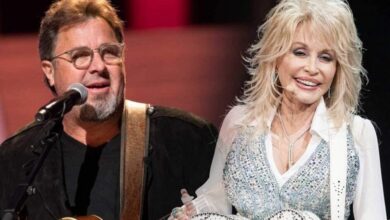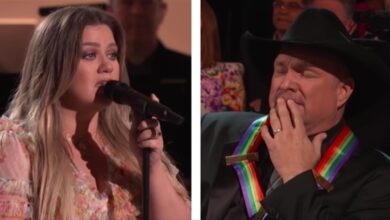Jeannie C. Riley, At 67, Shows Her Magic Remains Strong With “Harper Valley PTA”
Jeannie C. Riley occupies a significant place in the annals of country music history, recognized not only for her memorable hits but also for her pioneering role in advocating for female artists in a landscape often dominated by men. Her distinctive sound and magnetic stage presence captivated audiences everywhere, enabling her to carve out a unique niche that inspired many aspiring female musicians. With each performance, she brought an unwavering sense of authenticity, believing deeply in the songs she sang and the messages they conveyed. Her achievements laid the groundwork for countless women to follow in her footsteps, making her a trailblazer within the genre.
Riley achieved widespread acclaim with her breakthrough hit “Harper Valley PTA,” penned by songwriter Tom T. Hall. The song’s narrative, which delves into a mother’s confrontation with the local PTA over issues of morality and societal standards, resonated deeply with listeners. It captured a time when women’s voices were beginning to assert themselves against the traditional norms, offering a compelling commentary on hypocrisy and judgment. Its catchy melody paired with Riley’s emotive delivery transformed the song into an anthem for women’s empowerment. The success of “Harper Valley PTA” not only topped the charts but also fortified Riley’s position as a leading figure in both country and pop music realms.
Born on October 19, 1945, in Stamford, Texas, Riley’s love for music blossomed from an early age. Raised in a family immersed in musical traditions, she developed an appreciation for various styles, from country to gospel. Yet, like many artists of her era, her path to stardom was fraught with challenges. Moving to Nashville in the 1960s presented a fresh set of obstacles, as she navigated the competitive landscape of country music, attempting to stand out among many talented hopefuls. It was a journey marked by perseverance, with moments of frustration interspersed with gentle victories, leading to her eventual breakout.
The success of “Harper Valley PTA” was not just a fleeting moment but a transformative milestone that redefined Riley’s career trajectory. The song garnered her the prestigious Grammy Award for Best Country Vocal Performance in 1968, among other accolades, cementing her position in country music lore. With its impact, Riley opened avenues for greater representation of women in the industry, fostering an environment where female artists could express their identities and narratives without restraint. Her win for Single of the Year at the Country Music Association Awards reflected a burgeoning acceptance and acknowledgment of women’s contributions to music, encouraging others to strive for similar recognition.
Riley’s career, however, was not limited to the dizzying heights of her early successes. The music industry is inherently fickle and constantly evolving, often making it a challenge for artists to maintain relevance over time. As musical tastes changed throughout the 1970s and 1980s, Jeannie displayed remarkable versatility, venturing into gospel and other genres. This adaptability not only kept her career alive but also reinforced her identity as an artist capable of connecting with diverse audiences. Her artistic evolution showcased her desire to grow while remaining true to her roots, reflecting a rich tapestry of experiences through her music.
In recent years, Riley has demonstrated that her talents have not faded with time. Her appearance on New Year’s Eve in 2012, performing alongside Nashville’s own Jimmy Payne, was a stirring reminder of her enduring artistic prowess. The resonance of “Harper Valley PTA,” delivered with the heartfelt passion that first captured audiences decades prior, illustrates the timeless nature of her artistry. Fans are often moved by her ability to evoke emotions through both her voice and her presence, reminding everyone that genuine talent transcends the constraints of time.
Throughout her journey, Jeannie C. Riley faced numerous obstacles, both personally and professionally. The pressures of fame, coupled with the demanding nature of the music industry, required immense resilience and strength. Yet, through every trial she encountered, Riley’s spirit remained undiminished. Her story embodies the essence of perseverance, showcasing how a deep commitment to one’s craft can lead an artist through adversity. This unwavering dedication has allowed her to stand tall among her peers and has garnered her admiration from fans across generations.
Riley’s narrative extends beyond her artistic accomplishments; it is also a tale of cultural significance in the realm of women’s rights and representation in music. Her fearlessness in addressing social issues through her lyrics resonated with countless listeners and opened doors for future generations to explore similar themes. She carved a path that encouraged female artists to articulate their experiences honestly, paving the way for the creation of music that remains relevant and impactful. Even as she continues to perform and engage with fans, Riley’s legacy serves as an enduring inspiration—a reminder of the power of music as a vehicle for change and expression.
The profound influence of Jeannie C. Riley on country music is undeniable. With her groundbreaking achievements, timeless music, and emotional resonance, she remains a symbol of talent and determination. Her story stands as a beacon of hope, demonstrating how one woman’s voice can not only captivate hearts but also inspire significant social discourse. As emerging artists continue to navigate the musical landscape, Riley’s journey reminds them that they too can evoke change and uplift those around them through their artistry. In doing so, she contributes to a legacy that echoes far beyond her own, ensuring that her impact will be felt for generations to come.





